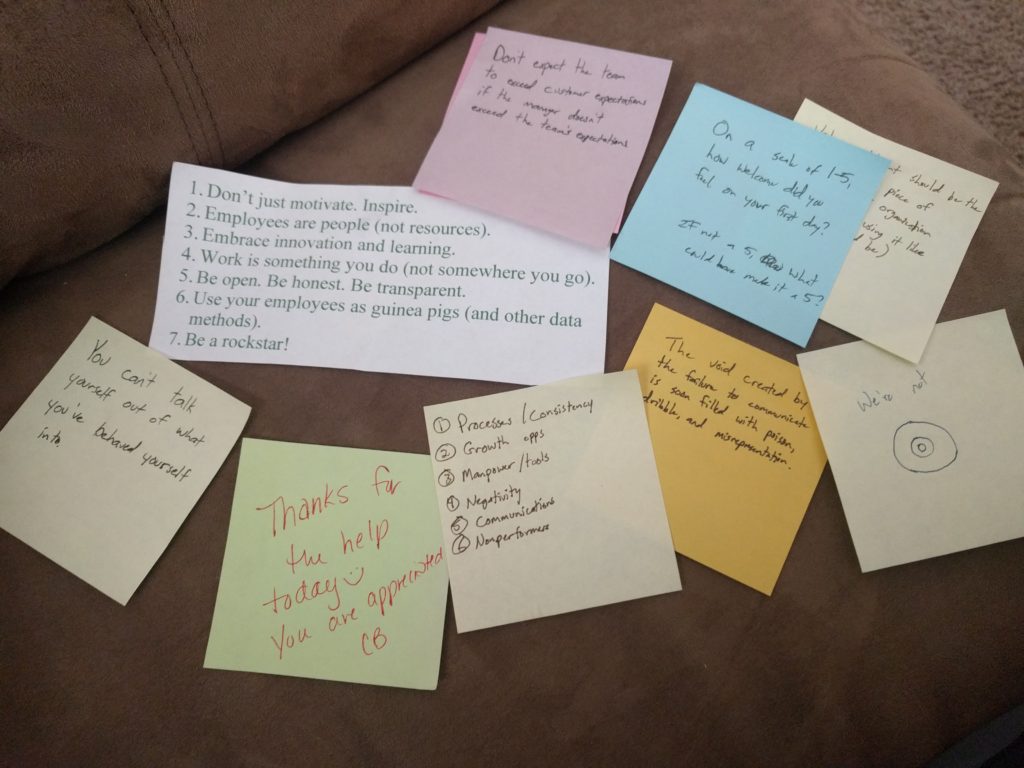 Last weekend my wife forwarded me an article that hit her right between the eyes. And to be honest, it did for me as well. It was a parenting piece that focused on one of the rampant problems we deal with in our house: toys. The gist of the piece is that our kids have enough toys and that buying them more just makes them more bored and more hungry for the next thing. It doesn’t satisfy them and provide lasting joy that one would expect from all the advertisement (and the whining that may occur prior to the purchase). The author’s alternative recommendation? Continue reading
Last weekend my wife forwarded me an article that hit her right between the eyes. And to be honest, it did for me as well. It was a parenting piece that focused on one of the rampant problems we deal with in our house: toys. The gist of the piece is that our kids have enough toys and that buying them more just makes them more bored and more hungry for the next thing. It doesn’t satisfy them and provide lasting joy that one would expect from all the advertisement (and the whining that may occur prior to the purchase). The author’s alternative recommendation? Continue reading
Monthly Archives: June 2017
How Talent Technology Enables Employee Engagement [Podcast]
Talent management technology has come a long way in recent years. I can still remember seeing a demo for a technology solution back in 2014 and the salesperson was so proud of the fact that I could copy and paste data into the system. By the way:
- It wasn’t searchable.
- You couldn’t run reports.
- You couldn’t export anything.
There was no way to actually USE the data in there, but I could put it in if I wanted. Sigh.
Anyway, today I am sharing a really fun podcast interview with you, featuring a recent conversation with Carsten Busch, CEO of the Talent Management Business Unit, and Laura Fuller, Country Sales Manager US for Lumesse. In the conversation we not only talked about how technology has become incredibly user friendly and more employee-focused, but about some of the age-old talent questions that companies face every day, such as why managers are willing to hire an external candidate even when there are perfectly qualified internal candidates available to take the job. Carsten’s answer to the question was phenomenal and I was taking notes because it will be my new default answer to that common issue.
Additionally, Carsten and Laura talk about the shift in technology from the static, administrative-focused versions mentioned above to the talent-focused systems that Lumesse and other companies are developing today.
Also, at the tail end I mention how you can get one of my upcoming pieces of research entirely for free by signing up here for a webinar I’m doing with the team at Lumesse. Here’s the gist of what the webinar will be about:
The June edition of HR Magazine has a feature that focused on how some companies like Gap and Siemens are trying to create development opportunities that connect candidates and employees to the firms for a long period of time. The double benefit of this kind of development is that if businesses can drive retention, then they get the value of a more productive workforce for a longer period of time. This is the incredible value of talent mobility, and that’s the focus of the webinar and this upcoming piece of research.
I hope you’ll join us for that session, and I’d love to hear your thoughts on the podcast as well. It was a really fun conversation.
9 Lessons for Running a Great HR Function
This weekend I was doing some spring cleaning. Well, summer cleaning, since I missed the spring season. Anyway, one of the things I found was a box of items I used to keep on my whiteboard next to my desk as reminders of important aspects of HR. These shaped the way I practiced HR and ran my department on a daily basis. I thought it would be fun to share the notes here to help give you an idea of what kind of HR I practiced.

1: Your Company Values
Your values statement should be the most tattered piece of paper in your organization.
Most companies pick out a few values as part of a management exercise or checklist and then forget about them. Want to hire great people that align with your mission? Use your values statement every day to keep measuring your candidates and employees to make sure they are on target.
2: Communication Breakdown
The void created by the failure to communicate is soon filled with poison, dribble, and misrepresentation.
My Anniversary
I attended the WorkHuman conference a few weeks ago in Arizona and connected with many friends and colleagues that I hadn’t seen in a while, and each of them asked how my work was going. This week marks my one year anniversary of running Lighthouse Research & Advisory, and it has been such a joy. Here is the link to my announcement last year, in case you’re a new reader.
I’m able to do the work that I love, whether it be writing, speaking/teaching, or research. I also have the flexibility to support clients in a way that other, larger analyst firms just can’t, and I keep hearing over and over how unique that is.
For those of you that are curious, my day to day is spent creating or uncovering research on a variety of topics. In the last month alone I’ve explored informal learning practices, global payroll and compliance for growth companies, and the impact of employee engagement on business performance. I then use that research to host webinars, write white papers, or create other research assets for my clients. At the end of the day, I’m creating things for you, the practitioners, that offer value and help you to get your work done more effectively. It’s just that the vendor community pays to have those resources developed for you.
Obviously I also run the We’re Only Human podcast, which kind of straddles both the work I do here at upstartHR as well as my work at Lighthouse. It has surprised me in the ten months that I’ve been running the podcast, but I get so much interaction and feedback from that medium and am constantly surprised by the positive reception. I’d be curious to know what you think about it and/or what you’d like to see me cover on the show.
At the same time, part of my research always has been (and will continue to be) in large part due to connectivity to the practitioner community. Each of you has a unique, valuable story to tell about your own business and HR practice. I am always interested in hearing those stories and learning from them. I’ve found that pretty much all practitioners think their stories are not that interesting or important, yet in every case I can find something unique or noteworthy about the situation in just a few short moments! Bottom line: your story IS important and interesting, and don’t ever think otherwise.
If you’d like to help, I occasionally send out research requests to gather information for new studies. Having responses from people like you is incredibly important to me. Additionally, don’t ever hesitate to ask questions about what I can cover here or to suggest topics that might be beneficial. I’m always open to ideas, and the truth is if you are thinking about it, there’s a good chance that a hundred others are that need the information as well!
So, with eight years of upstartHR and one year of Lighthouse Research behind me, I’m still going strong and feeling just as creative as the day I first started (if not more so). I can’t wait to bring you more insights, ideas, and information in the coming months. And you? Yeah, keep up the good work. :-) Thanks as always for being a part of this great community!
HR’s Bad Reputation is Discouraging Me from an HR Career
Dear Alison,I’m currently in my final year of high school and strongly considering pursuing an HR designation in post-secondary. Reading through your blog, I am very often reminded that HR exists primarily for the company (preventing lawsuits, attracting and retaining talent, etc.) and issues that employees have are resolved with the company’s best interests in mind. As such, I can understand why HR can sometimes gain a reputation for being useless (even if I do find it somewhat discouraging).That being said, I would like to ask you for your input on what an effective HR manager should be like in terms of going above and beyond to support employees when the job description may not ask for it.I’m thinking especially on how you would advise someone on the HR side to handle a situation where, for example, a department manager is out of control (but not doing anything illegal) and because of nepotism, is safe from consequences or intervention? If HR’s hands are tied, how could HR still go on to assist the employee even though the root cause isn’t solved?How can HR still be supportive to employees in situations where the company calls for neutrality (or even to side with the company when it is ethically at fault)? And vice-versa?I think overall I am just experiencing a sense of helplessness when I read stories with negative experiences with HR. On one hand, I can understand that there may be certain legal and logical restrictions to what an HR rep can do that sometimes the employee can’t see. On the other hand, I don’t want to be someone who just throws her hands up and says, “There is nothing I can do for you.” and adheres to the bare minimum requirements.Is this something that will get better once I have more experience? Am I just being too emotional or naive about my job expectations? If so, any input on helping me recalibrate?-J
Thank you for being very clear about your questions and concerns, J.
HR does exist to protect the company, and this is still prevalent thinking in many organizations. However, it's also true that many forward-thinking firms are offloading these compliance-related functions to legal and are focusing more on how to improve employee performance, create better working environments, drive worker engagement, etc.
5 characteristics of a great HR manager Continue reading